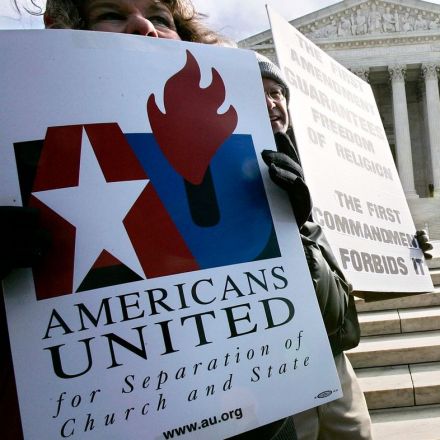

10 years ago
12
Put away your Bible, Justice: The new “religious freedom” arguments are neither
The faithful want to follow a "higher law" than the Supreme Court. Even some justices. Here's why they're wrong
Continue Reading


























Join the Discussion
"In a representative democracy, obviously, citizens are free to band together and campaign for changes to laws they consider unjust." The Supreme Court is the final say, Dred Scott, anyone?
It is interesting both of the points you highlight.
First, citizens are definitely free to band together to campaign for changes to laws they feel are unjust. However, in the case discussed in the article, repealing the new law of the land will violate the constitutional rights of those covered by the new law. And whether you agree with it or not, it has now been decided by the Supreme Court. The only way they can hope to make a change is to campaign for their local representative in Congress to make/vote for a constitutional amendment.
Second, Dred Scott is not a really a comparable example as it deals with someone who is technically not a US citizen - as unjust as it may be. The gay people in question - whether the religious crowd likes it or not - are definitely citizens of US.
I did not use "Dred Scott" as a similar case as to content, but as my best example of which the Supreme Court got completely wrong. ...... "The only way they can hope to make a change is to campaign for their local representative in Congress to make/vote for a constitutional amendment."...... Nope.....the Supreme Court can and has reversed itself..........So while the Supreme Court may have the final say, its' say isn't always final.
Ah yes, you are correct about the Supreme Court - they can reverse themselves. But that would require one or more of the 5 that voted in favor to either change their mind or drop dead and be replaced by Christian conservative justice(s) that would vote their religious conviction over the Constitution.
And I would argue that the Supreme Court didn't get the Dred Scott case wrong from a legal standpoint as slaves were technically not citizens - the decision can be said to be morally wrong though.
"Curtis conducted an extensive historical review of statutes, case law, and demographic records and asserted that in five of the original 13 states, blacks had held citizenship at the time of the Constitution's ratification -- and that they had therefore voted and participated in the process of its ratification. It was "not true, in point of fact, that the Constitution was made exclusively by the white race,""Therefore, blacks were "in every sense part of the people of the United States [as] they were among those for whom and whose posterity the Constitution was ordained and established."- Benjamin Curtis (dissent) As to Dred Scott himself, Taney's majority opinion contained obvious bias, but not totally without legal basis. However the decision went far, far beyond just Dred Scott and basically enslaved a whole population of prior free men, and then opened the entire west to slavery, by overturning existing law............."Slaves" were not citizens, correct, but there were black citizens, just not deemed as such by Taney et al. ............. Scott v. Sandford was little, in proportion, about Dred Scott and the results a travesty.
I think honestly these sorts of articles are disingenuous at best. The church has always had a one man one woman understanding of marriage with the man as the head. The people misquoted the verse about obeying, in truth it's not just that the woman should obey the man, but that the man is to love the woman as Christ loved the church, in short to be willing to die for her.
Sure, government employees should follow the law, and frankly not be jerks about it. That I agree with, but I think my problem here is that enemies of Christianity are misrepresenting what it is.
Nope. Try again.
That's nice, but the Bible is still filled with verses emphasizing the claim that women should be subordinate to men.
Please elaborate. What is being misrepresented here?
The biggest issue is that many people on each side of this debate forget that the Bible was not written in a vacuum and is not meant to be literally applied in its entirety. It's filled with passages which talk about how the original audience should have behaved in their time, but the purpose of these passages was not to dictate how all Christians should live in all contexts. A great example is Romans 16:16 in which Paul says that the Roman Christians are to greet one another with a holy kiss. Obviously Paul does not expect that all Christians should kiss each other all the time throughout all of history in every culture. Kissing was a Roman greeting. Paul was simply implying that they should greet each other as friends. Many Christians feel the same way about the household codes found within Paul's writings. It was part of the culture of that day being reflected in scripture. Many believe that the purpose of the house hold codes was not to set forth a precedent that all Christians are to always follow, but to take something that was part of the culture of the audience and use it in a Biblical context.
Cool. One question, though: which comment of mine are you attempting to address?
I was just making a comment on how things tend to be misrepresented. I actually feel like Christians have only ourselves to blame. We tend to do a fantastic job misrepresenting what we mean. I can do my part by offering up examples as to why scripture says some of the things odd things it says.
Also, I really enjoyed that article you linked to. I have never heard of same sex unions in church history before.
/u/septimine made the claim that the enemies of Christianity misrepresents what it is. I asked him to clarify what the article misrepresents. We seem to have entered a tangent in which the context argument has become the focus but I would still like to hear from someone how the case against "religious freedom" arguments are misrepresenting Christianity.
Oh, my apologies. It seems that I have gone on a tangent. To redeem myself I'll try and bring this back on topic. I'll say that I do feel that religious freedom arguments aren't founded in the Bible. I haven't seen one yet that seems to be supported by scripture. My religious rights end when they start taking away the freedoms that others enjoy.